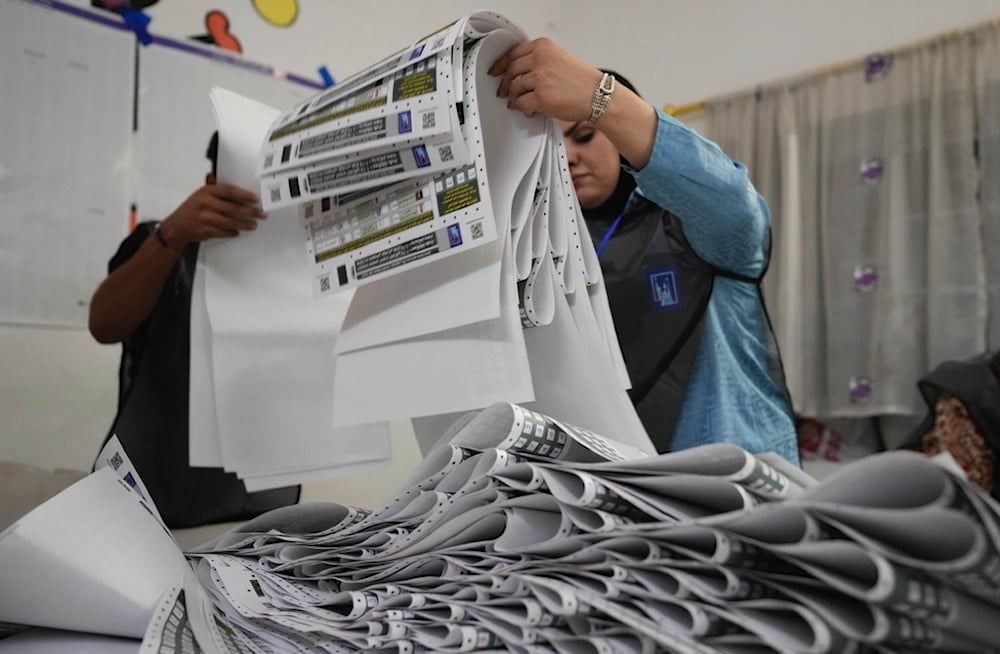Reconstruction coalition leads Iraq’s election results, wins 46 seats
Iraq’s electoral commission confirms the Reconstruction and Development coalition tops final results with 46 seats, as parties begin negotiations to form a government.
-

Election workers gather parliamentary election ballots after the polls closed in Baghdad, Iraq, November 11, 2025 (AP)
Iraq’s Independent High Electoral Commission announced on Monday the final results of the parliamentary elections, confirming that the Reconstruction and Development coalition led by Prime Minister Mohammed Shia’ al-Sudani has secured first place nationwide.
The coalition won 46 seats in the 329-member parliament, placing al-Sudani and his allies in a leading position as political blocs prepare for government formation negotiations. The Taqaddum Party and its affiliated lists followed with 33 seats, while the State of Law coalition secured 29 seats. The Sadiqoon movement won 27 seats, and the Kurdistan Democratic Party captured 26 seats.
The National State Forces and Badr Organization obtained 18 seats each, according to the commission’s tallies.
Regional results reveal shifting electoral dynamics
The commission also released detailed figures showing how alliances performed across key provinces:
Baghdad Governorate
Turnout: 48.86% — 2,129,883 voters
Top Results:
- Reconstruction & Development Coalition — 15 seats (411,300 votes)
- Taqaddum Party — 10 seats (277,416 votes)
- State of Law Coalition — 9 seats (228,300 votes)
- National State Forces Alliance — 5 seats (138,904 votes)
- Al-Sadiqoon Movement — 5 seats (128,249 votes)
- Al-Azm Alliance — 5 seats (128,122 votes)
- Badr Organization — 4 seats (116,704 votes)
- National Sovereignty Alliance – Tashree — 4 seats (110,037 votes)
- Al-Asas Al-Iraqi — 4 seats (104,164 votes)
- Huqooq Movement — 3 seats (77,763 votes)
Al-Anbar Governorate
Turnout: 66.81% — 695,593 voters
Top Results:
- Taqaddum Party — 5 seats (212,838 votes)
- Anbar Is Our Identity Alliance — 3 seats (128,325 votes)
- Qimam Coalition — 3 seats (97,635 votes)
- Al-Azm Alliance — 2 seats (78,446 votes)
- Al-Tafawwuq — 1 seat (47,074 votes)
- National Sovereignty Alliance – Tashree — 1 seat (40,820 votes)
Kirkuk Governorate
Turnout: 65.23% — 621,773 voters
Top Results:
- Patriotic Union of Kurdistan — 4 seats (178,845 votes)
- Taqaddum Party — 3 seats (107,037 votes)
- Iraqi Turkmen Front — 2 seats (66,179 votes)
- Kurdistan Democratic Party — 1 seat (59,374 votes)
- Arab Alliance in Kirkuk — 1 seat (53,046 votes)
- Emad Yokhana Yaqo Yokhana al-Imadi — 1 seat (17,680 votes)
Najaf Governorate
Turnout: 43.67% — 360,140 voters
Top Results:
- Reconstruction & Development Coalition — 2 seats (56,464 votes)
- National State Forces Alliance — 2 seats (45,224 votes)
- State of Law Coalition — 2 seats (41,173 votes)
- Al-Sadiqoon Movement — 2 seats (40,338 votes)
- Khadamat Alliance — 1 seat (33,000 votes)
- Abshir Ya Iraq Alliance — 1 seat (32,706 votes)
- Al-Asas Al-Iraqi — 1 seat (27,657 votes)
- Ishraqat Kanoon — 1 seat (24,823 votes)
Turnout rebounds sharply from 2021
National voter participation rose to more than 55%, up from 41% in the 2021 elections..
With no outright parliamentary majority, Iraq now enters a pivotal negotiation phase. Under the constitution, once parliament elects a president, the head of state will nominate a prime minister from the largest parliamentary bloc to form the next government.
As in previous election cycles, coalition-building is expected to be a lengthy and delicate exercise, shaping Iraq’s political pathway in the years ahead.

 3 Min Read
3 Min Read










